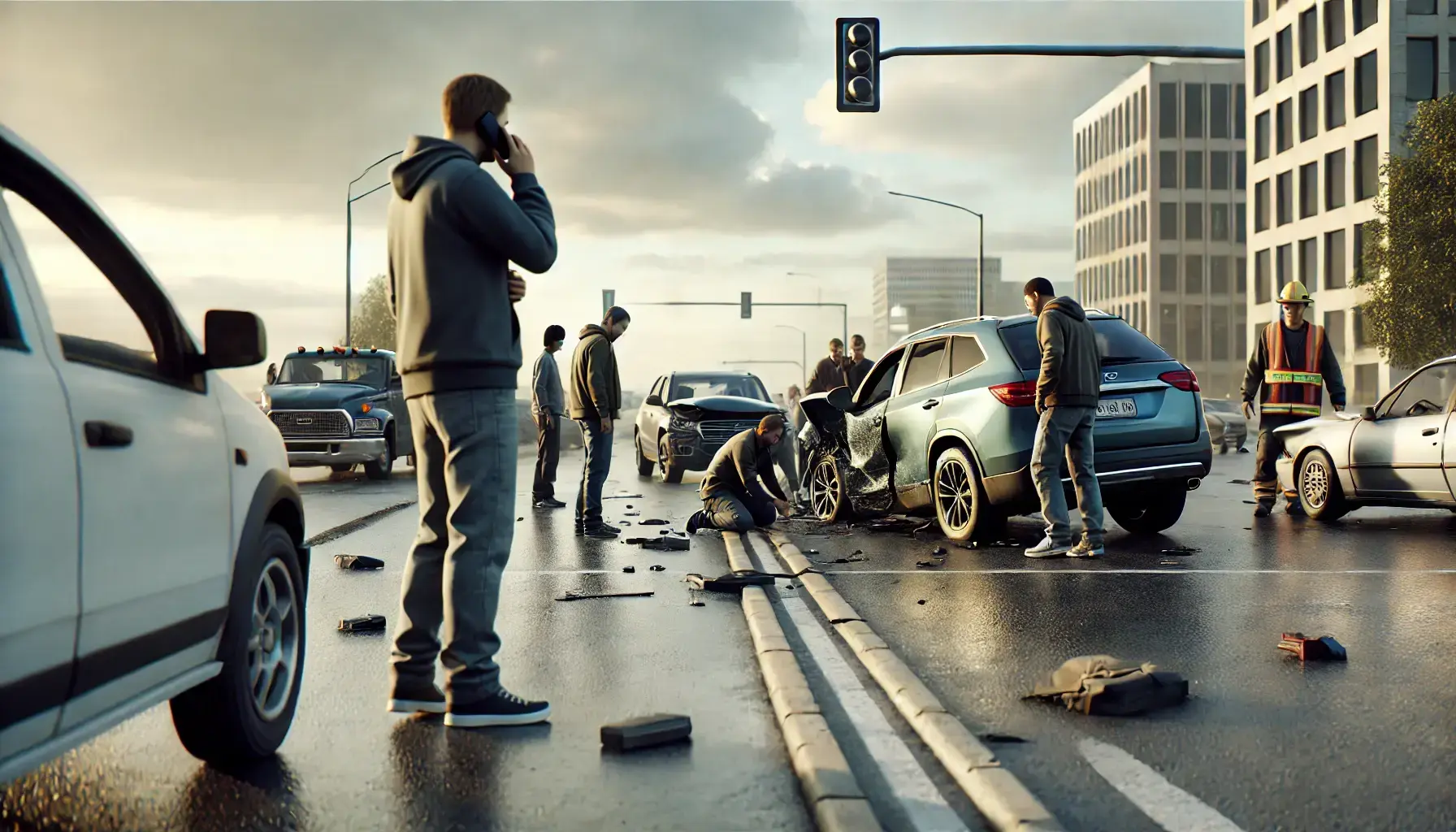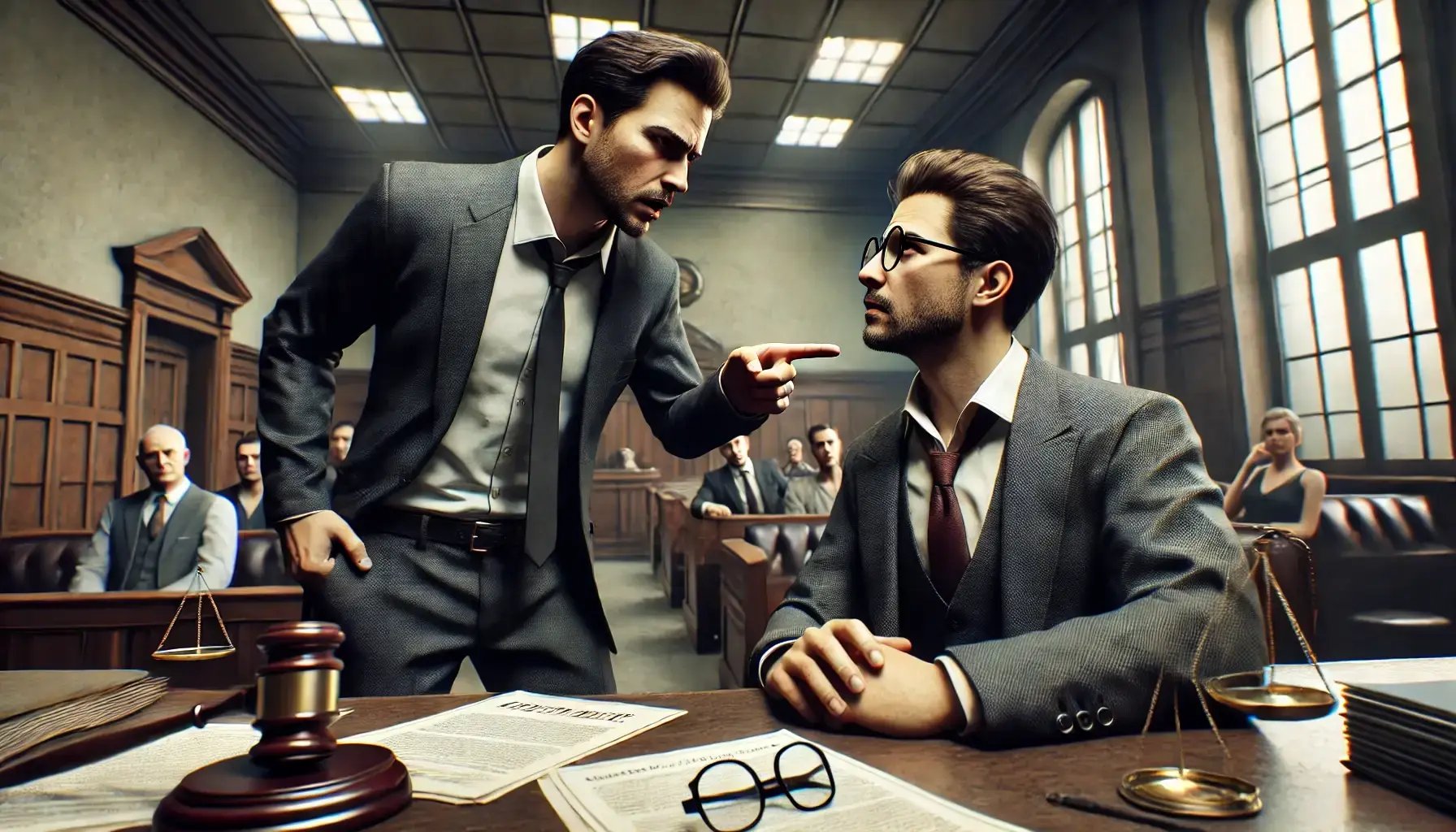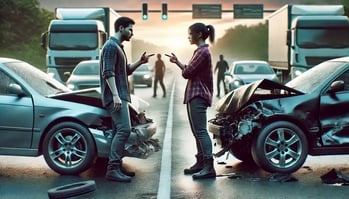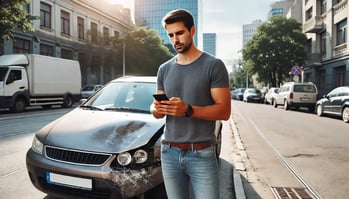What is a No Injury Car Accident

Legally reviewed by:
Daniel Smith September 20, 2024
Car accidents are devastating and could leave their victims scared, confused, or in shock. However, while all accidents are terrible, some are worse than others. The degree of severity and damage suffered in a car accident could significantly affect how you should deal with it.
If a car accident you've been in is to be classified by fatality, then you've likely heard the term "no injury car accident." But what exactly does that mean? We discuss that in this article along with what you should do after a no-injury car accident, and if you could sue another driver or a responsible third party.
No-Injury Car Accident Explained
No-injury car accidents are accidents that do not result in any bodily injury to parties directly involved in the accident or any third parties.
No-injury accidents are also known as property damage-only accidents, and they make up most of the accidents in the United States. According to a June 2024 report from the National Highway and Traffic Safety Administration, no injury accidents made up 4.2 million (71%) of all the 5.9 million accidents in 2022.
Chances are, if you are ever involved in a car crash, you will suffer only property damage. Therefore, knowing how to react to these accidents is important.
What To Do After a No-Injury Car Accident
After an accident, the first thing you should do is stop. Then, you should check yourself and your passengers for injuries. Once you have confirmed there are no injuries in your vehicle, ensure that the other driver or the other involved party has also suffered no injuries.
Once you have confirmed that no injury whatsoever has resulted from the accident, do the following:
Find a safe place to park
If an accident has occurred in a place where it could obstruct traffic, you should remove it from that position to the nearest safe place to park. This step is required by law in most states.
Take Colorado, for instance, Colo. Rev. Stat § 42-4-1602 requires that drivers involved in any accident resulting only in damage should stop at the accident scene or as close as possible, as long as such stop does not obstruct traffic more than is necessary.
Similarly, Iowa’s Iowa Code § 321.262 provides that after an accident that causes only property damage, drivers are to remove the vehicle from the traveled portion of the road to the nearest shoulder, emergency lane, or median without obstructing traffic more than necessary; and only if the vehicle is operable with its removal possible in a safe manner.
If you can’t move the car, call 911 or local police even if there has been no injury, and wait on the scene until they arrive.
Exchange relevant information
After all vehicles involved in the accident have been moved to a safe location, the parties involved must exchange relevant information. Relevant information here will include names, vehicle registration, and insurance. This is also a legal requirement.
In Minnesota, it is provided for under Minn. Stat. § 169.09 where subdivisions 2 & 3 require drivers to exchange their names, date of birth, mailing address or email address, and registration plate number on the scene.
It also provides that if they do not provide the name and address of their local insurer with the name of their local insurance agent on the scene, they must do so within 72 hours.
Subdivision 4 further states that if the no-injury accident is with an unattended vehicle, the driver must locate the driver or owner of the unattended vehicle and give their name and address to the driver or owner of the unattended vehicle, and if they cannot find them, they must write down their information to leave in a conspicuous place on the vehicle they hit.
Delaware has a similar provision under Del. Code tit. 21, § 4201 where drivers are required to give their name, address, and vehicle registration number, and exhibit a driver's license to the other party to the accident. The other party may be the owner of a property damaged by the collision, another driver, or occupants of another car.
Failing to comply with this requirement in any state will likely result in a misdemeanor.
Document the accident
After exchanging the information with the other party, you should collect as much evidence as possible about the accident. The easiest way to do this is by taking pictures and videos. You should take pictures and videos of the damage to your car, the damage to the other car or property, the surroundings, and the actual scene of the accident if possible.
If you can speak to any witnesses, you should also ask them to give a dated and signed written statement of what they saw. A third-party witness description of events could significantly help any subsequent insurance claim. You should also get a way to contact your witnesses; preferably a phone number or home address.
Report when necessary
Police reports are also helpful evidence for insurance claims. But, they might be slightly harder to obtain for no-injury accidents. This is because the law requires that certain damage thresholds must be reached to warrant a police investigation for a property damage only accident.
In Georgia, property damage resulting from an accident must exceed $500 before you are required to report it to the police according to Ga. Code Ann. § 40-6-273.
Meanwhile, in Indiana, there is no requirement to report accidents resulting in only property damage to the police, but Ind. Code § 9-26-2-1 requires police officers to investigate a property damage accident, only if property damage exceeds $2,500.
But in Nebraska, property damage equaling or exceeding $1,500 will warrant reports according to Neb. Rev. Stat. Ann. § 60 – 699.
In many states, once property damages from a no-injury accident exceed the legally stipulated threshold, you will also be required to file a report about the accident with the Department of Motor Vehicles or the Department of Transportation. However, for some other states, once law enforcement agents investigate the accident, you will no longer be required to report to the DMV.
Due to the varying reporting requirements across states, it is always helpful to be familiar with the reporting requirements for no-injury accidents in your state.
Inform your insurance company
Whether you intend to file a first-person claim or not, you should always inform your insurance company once you've been in an accident.
Many insurance companies require this in their policies, and they may sometimes cite a failure to inform them early enough as grounds to reduce or deny a first or third-person claim that arises from the accident you were involved in.
Can You Sue?

Yes. The presence or absence of injuries in an accident rarely affects whether a lawsuit regarding that accident can be filed successfully.
There are three categories of people you could sue for a no-injury accident: The other (responsible) driver, your insurer, and any responsible third parties.
The other driver
Unlike with injuries where many states adopt a no-fault approach that does not consider responsibility for the accident to determine liability but requires each driver to bear the cost of their medical treatment through their insurance; with property damage only accidents, financial liability always rests on the driver that causes the accident.
If the responsible driver, or the responsible driver’s insurance company, fails to offer a reasonable settlement, you can sue the driver to get the compensation amount you reasonably believe you deserve.
It is important to mention that whatever compensation you're entitled to will be negatively affected in court if you share some responsibility for the accident. Different states have varying legal frameworks that determine how shared responsibility should affect a potential compensation. You can read more on the implications of both drivers being at fault here.
Your insurer
Certain instances may also require you to sue your insurer in property damage accidents. For this to be possible, you need to first have the relevant coverage (collision or comprehensive) that will cover such an accident. You will then make a first-person claim against the coverages.
With the appropriate coverage, a leading cause of lawsuits against insurers arises due to insurers failing to pay out what claimants believe to be a reasonable settlement. If you make a claim, and your insurer refuses to pay it or acts in good faith while handling your claim, you could sue them to ensure you get what you are owed.
Responsible third-party
No injury accidents resulting from the actions of a negligent third party could also result in a lawsuit against that party. Say, for instance, that while trying to dodge a pothole on the freeway, you crash into another car.
Thankfully, no one was injured but your car had to be towed away and would need extensive repairs. You could sue the county or state government, or whoever is responsible for maintaining that road and claim that their negligence caused the damages to your car, so they should be financially responsible.
As another example, if construction debris somehow obscures your view and causes a no-injury accident for you. You will also likely be able to sue the construction company to recover damages for that accident.
Responsible third parties could be almost anyone, as long as they meet certain criteria. The criteria being that they had a duty to take care, they failed to perform that duty, and their failure caused that accident which resulted in you suffering damages.
Compensation You Could Recover
If you have been involved in a no-injury accident, the compensation you could recover from the responsible party includes:
- Repair or replacement cost: You will be entitled to receive the amount needed to restore your property to its previous state successfully, or to replace it when the damage is beyond repair.
- Towing fees: If your vehicle had to be towed away from the accident scene, you should be able to recover any towing fees spent from the responsible party.
- Rental costs: If you had to rely on a rental to carry out functions you would have carried out with your damaged property while your property was being repaired or replaced, you would be entitled to recover the rental costs over the period you relied on it.
- Damage to specific items; If certain other valuable items were damaged in the crash, you could be entitled to having them replaced or repaired.
- Lost wages: You may also be entitled to recover wages you lost because of the accident. However, to recover lost wages, you may be required to unequivocally show that said lost wages resulted because of the accident.
Get in Touch with The Accident Helpers
At The Accident Helpers, we help you secure the best legal representation around you!
Navigating a no-injury accident without legal representation can be daunting. However, with experienced lawyers to assist you every step of the way, your chances of getting your desired outcome increase tremendously because lawyers do more than just represent you in court when you need to sue.
We've discussed the importance of being familiar with reporting requirements in your state, and your lawyer can make sure that you meet all the requirements, and in some cases, fulfill these requirements on your behalf.
Lawyers will also attempt to negotiate a reasonable settlement so you won't have to spend months or years in court before receiving your compensation. Lawyers advise how to best file an insurance claim, who to sue, and much more.'
With our help at The Accident Helpers, you can enjoy all that a lawyer has to offer without the initial worry and stress of trying to look for a reliable lawyer in your area.
We will only connect you with experienced, trusted, and skilled lawyers who are geographically close to you, so you can see them and rest assured that they are well-versed in your local laws.
What’s more? Getting in touch with us won’t cost you a penny. Our services are free. So, all you need to do is schedule a consultation with us, and let’s get to helping you.




